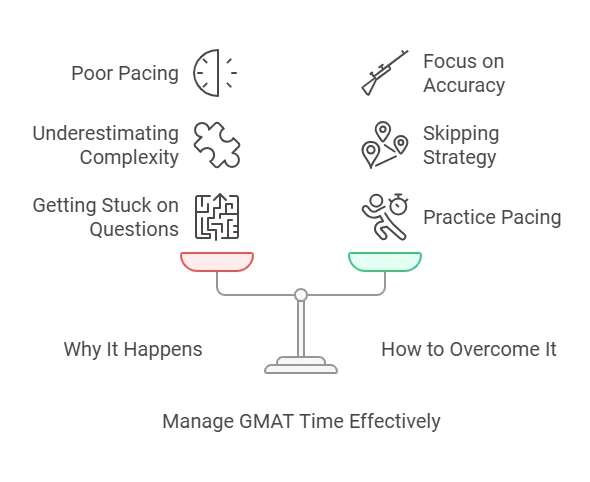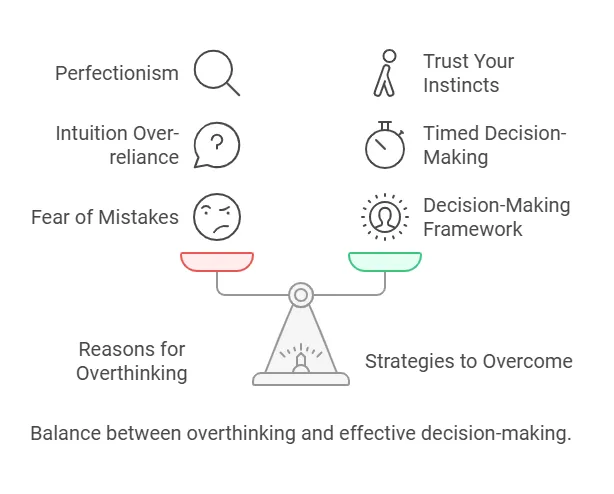Time Management challenges Students Face During GMAT | How to Overcome Them
The GMAT is difficult for its challenging format and tight time constraints. For many test-takers, it can feel like a race against the clock, where every second counts. While mastering the material is crucial, effective time management is the ultimate game-changer. Let’s take a closer look at the most common time management challenges students face during GMAT and how you can tackle them with confidence.
The “Oh No!” Moment: Running Out of Time
One of the most common experiences during the GMAT is realizing you’re running out of time. You start the section confidently, but before you know it, the clock is ticking down, and you have a pile of unanswered questions. Panic sets in, and accuracy goes out the window.
👉Why it happens:
Getting stuck on tough questions: It’s easy to spend too much time wrestling with a particularly tricky question, forgetting about the others waiting for you.
Underestimating question complexity: Some questions might seem simple at first glance but require detailed calculations or nuanced reasoning.
Poor pacing: Without a clear plan for how much time to spend on each question, it’s easy to fall behind.
👉How to overcome it:
➢Practice pacing: Regularly take timed practice tests to simulate exam conditions. After each test, analyze where you spent too much time and work on improving your speed in those areas.
➢Develop a question-skipping strategy: If a question has you stumped, mark it and move on. Return to it only if you have time at the end.
➢Focus on accuracy over speed: It’s better to answer fewer questions correctly than to rush through the section and make careless mistakes.

The “Analysis Paralysis” Trap
Overthinking is a common pitfall for GMAT test-takers. You find yourself scrutinizing every detail, second-guessing your instincts, and spending far too much time on questions that shouldn’t be so challenging.
👉Why it happens:
Fear of making mistakes: The high stakes of the exam can make you overly cautious.
Over-reliance on intuition: Trusting your gut can be helpful, but overanalyzing every answer choice can lead to wasted time.
Perfectionism: The desire to find the “perfect” answer can result in endless deliberation.
👉How to overcome it:
➢Develop a decision-making framework: Create a personal set of rules. For example, if you can eliminate two answer choices, make an educated guess and move on.
➢Practice timed decision-making: Train your brain to make quick judgments by practicing under timed conditions.
➢Trust your instincts: After thorough preparation, your first instinct is often correct. Don’t let overthinking derail you.

The “Data Overload” Dilemma
The GMAT loves to throw a lot of information at you—data tables, graphs, and wordy problems that require careful interpretation. Processing this information quickly and accurately is a skill in itself.
👉Why it happens:
Difficulty interpreting data: Misreading charts or tables can lead to incorrect conclusions and wasted time.
Overlooking key details: Getting lost in the information and missing the most relevant points can hinder your progress.
Poor note-taking: Without efficient note-taking, it’s easy to lose track of important details.
👉How to overcome it:
Practice data interpretation: Spend extra time on data sufficiency and problem-solving questions involving graphs and tables.
Master effective note-taking: Develop a system for quickly jotting down essential information and organizing it logically.
Boost reading comprehension: Strong reading skills are critical for quickly identifying the key elements of a problem.
The “Brain Freeze” Blues
Even with thorough preparation, mental blocks can happen. You might encounter a question that leaves you completely stumped, triggering anxiety and a spiral of self-doubt.
👉Why it happens:
Test anxiety: The pressure of performing well can cloud your thinking and make it hard to focus.
Lack of sleep or nutrition: Fatigue and poor nutrition can significantly impact cognitive function.
Overconfidence or under confidence: Both extremes can mess with your performance. Overconfidence can lead to careless mistakes, while under confidence can cause hesitation.
👉How to overcome it:
Practice relaxation techniques: Techniques like deep breathing, mindfulness meditation, and progressive muscle relaxation can help calm your nerves.
Prioritize sleep and nutrition: Ensure you get a good night’s sleep before the test and maintain a balanced diet to fuel your brain.
Stay positive: Remind yourself of all the hard work you’ve put in and focus on your strengths. A positive mindset can go a long way.
The “Section Switching” Syndrome
The GMAT’s structure requires you to shift gears seamlessly between different question types within a section. Adapting to these transitions can be challenging, especially when mental fatigue starts to set in.
👉Why it happens:
➢Lack of practice with diverse question types: If you focus too much on your strengths and neglect weaker areas, switching between question types can be jarring.
➢Mental fatigue: Transitioning between question types can be especially taxing towards the end of a section.
👉How to overcome it:
Mix up your practice sessions: Include a variety of question types in your practice to simulate real exam conditions.
Take short breaks: Use the breaks between sections to recharge and refocus.
Develop a consistent approach: Create a systematic method for tackling questions that can be applied across different types, reducing the cognitive load of switching.
Final Thoughts
Time management on the GMAT isn’t just about speed—it’s about making smart decisions and staying calm under pressure. By practicing regularly, developing effective strategies, and maintaining a positive mindset, you can turn the clock from an enemy into an ally. Remember, every second counts, but so does every ounce of preparation. With these tips, you’ll be well-equipped to conquer the GMAT clock and achieve your target score.



